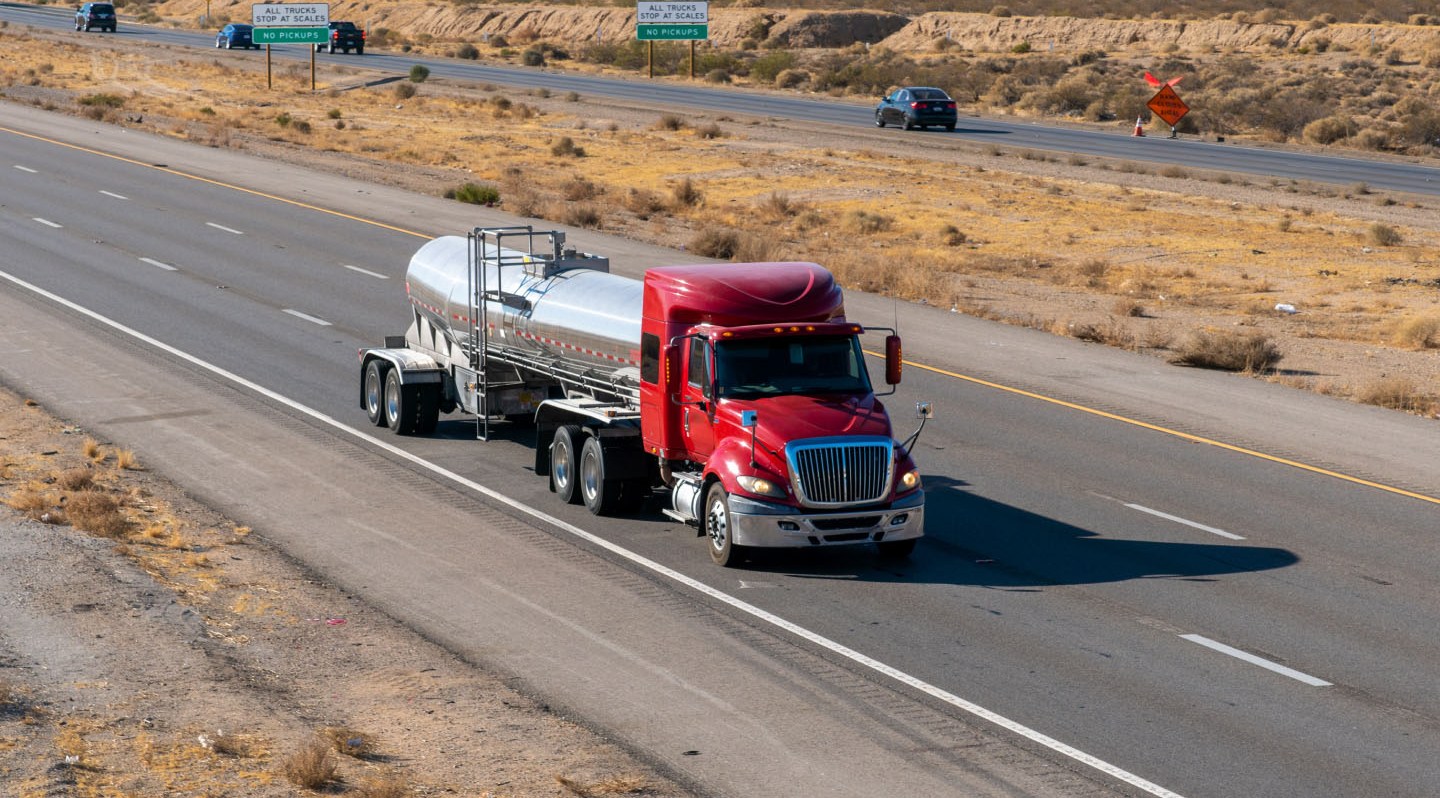- Becoming a tanker truck driver is a lucrative opportunity
- There are specific responsibilities you need to handle with tanker truck driving
- Support your skills as a tanker truck driver with technology
Tanker truck drivers enjoy a challenging but rewarding role transporting different types of loads to all sorts of locations. Find out if being a tanker truck driver is the right fit for you and how to succeed as a tanker truck driver.
What is a tanker truck driver?
Tanker truck drivers serve the oil and gas industry as well as chemical and agricultural. You may be required to haul hazardous materials such as gasoline, oil lubricants, petroleum, or other types of chemicals. You could also be required to haul nonhazardous liquids, including milk and water, or solid dry bulk materials, including sugar or cement mix.
There’s a huge variety of tanker truck driving jobs. Still, you’ll need a specialized license to be a tanker truck driver. Driving hazardous materials is higher stakes, so often companies hire more experienced CDL drivers for these roles.
Key tanker truck driver duties and responsibilities
Tanker truck and hazardous material (hazmat) driver roles are more challenging. You need to be both physically and mentally prepared for the added responsibilities. It’s an adventurous job, but that also means you can spend a lot of time on the road.
Operating a tanker truck is more taxing, even if the cargo is non-hazardous, because it’s often much heavier than other cargo. You might also experience a sloshing effect with a liquid tanker load, which may affect braking and handling. Whether the tanker is full or empty also affects the truck’s handling in a way that the driver needs to be prepared for.
In addition to safely operating the tanker truck on the road, you could also be required to connect hoses, ensure tight seals, open valves, and start pumps to fill tanks. You may also need to read gauges and record quantities, and understand different hazmat classifications. As a tanker truck driver, you’ll be expected to keep a more detailed record of your work.
What skills do you need to be a tanker truck driver?
You’ll need both hard and soft skills to succeed as a tanker truck driver. Being a good driver and having an excellent driving record is a starting point. But you’ll also need to be good at keeping records, which can call for you to be attentive to detail.
Employers will also want you to have excellent time management skills to ensure cargo is delivered on time. Excellent customer service skills will help too, as you’ll be interacting with customers in a professional manner along the route.
What to expect from tanker driver training
Because of the added responsibility of tanker truck driving, you’ll go more in depth in this type of training. You’ll learn about planning routes while also considering weight limits, weather, traffic, and hazardous materials regulations.
Training will also cover what you need to know to inspect and maintain the tanker truck to securely load, transport, and unload materials.
You may go into more detail about records maintenance as well. As a tanker truck driver, you’ll need to record pickups, deliveries, tolls paid, expenses, miles driven, number of stops, and proof of delivery.
Do tanker truck drivers need extra licenses?
To be a tanker truck driver, you’ll need to add a tanker endorsement (N) to your commercial driver’s license (CDL). You can simultaneously get your N endorsement and qualify as a hazmat driver (H) if you take the (X) endorsement. The bundled endorsement lets you drive a vehicle carrying any liquid gas in tanks of 1,000 gallons or more and drive hazmat too. The tanker and hazardous materials tests can be taken at your local department of motor vehicles (DMV).
How much does a tanker truck driver make?
On average, a tanker truck driver can expect a base pay of $59,584 per year. That’s a global median according to Glassdoor, which puts the total pay per year at $71,034 per year. It includes $11,450 additional pay per year in the form of bonus, commission, tips, and profit sharing.
Pros and cons of being the driver of a tanker truck
There are both advantages and disadvantages for the driver of a tanker truck. On the plus side, tanker truck drivers make more to reflect their additional expertise and the more difficult work. They can also be rewarded with better benefits such as a higher level of health insurance, life insurance, and more vacation days.
At the same time, tanker truck drivers often need to make frequent stops. For example, a tanker with gasoline may have to stop at multiple stations. This can be a good thing too. After all, you’ll typically have shorter load/unload times and get home more often.
Since you could be dealing with hazardous materials, tanker truck drivers can be less hands-on as well. You’re not going to be out trying to track down a loose tie on a rainy day. Still, you could be working with dangerous cargo. This can mean more stress on the road. You may also be required to meet more regulations and wear safety equipment. Finally, you may draw more inspection attention if you’re driving hazmat in a tanker truck.
Check out these tips for improving driver safety on oil and gas job sites.
Top tips for finding the best tanker trucking companies
There’s high demand for truck drivers, and it’s not expected to slow down any time soon. To find the best tanker truck companies to work for, ask other drivers, look for company reviews online, and search job boards, such as CDLjobs, to get connected with a carrier.
To compare companies, you’ll want to find out:
- How the pay system works.
- What ongoing training and professional development they offer.
- What benefits are offered.
- How long the company retains its drivers on average.
If you can also speak directly with someone in dispatch and a terminal manager, you’ll be able to learn more about the company’s culture.
How Motive helps support tanker truck drivers
Tanker truck drivers need to be alert on the road. With better route optimization, support for safety checks, and insights into loading and uploading along the route, online tools can help you focus more time and energy on delivering cargo on time and safely.
Compliance is easier with Motive’s platform, which helps prevent violations and automates compliance reporting. Fleet managers also get the advantage of ELD compliance, IFTA reporting, and CSA insights. All in one place.
When you’re working for a fleet with Motive’s management software, you can enjoy the benefits of real-time connectivity and universal GPS tracking. These features can help optimize routes and make sure drivers get the most out of their hours on the road.
Motive’s fleet management software also supports enhanced driver safety. As a tanker driver, you can benefit from advanced AI tools that help detect unsafe driving behavior and warn you in advance. That means fewer accidents, which keeps you safe and your driving record intact. Motive’s powerful automated coaching tool can also help you constantly improve and drive more safely overall.
Motive can have an impact in many areas of your experience as a tanker truck driver. Find out more about the power of our fleet management software.




